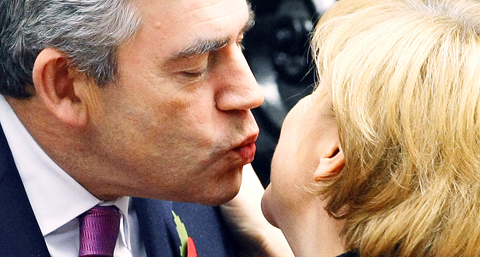British Prime Minister Gordon Brown was scheduled to begin a tour of oil-rich Gulf states yesterday, hoping to persuade them to give extra funds to help countries hit by the world economic turmoil.
Brown will spend four days in the region holding talks with leaders as he pursues his efforts to help coordinate the global response to the world economy’s dramatic plunge.
Earlier this week, he said he wanted the IMF’s US$250 billion bailout fund for countries hit by the financial crisis to be extended to prevent “contagion” spreading to other nations.

PHOTO: AP
The former finance minister said that he wanted Gulf states and China to be among the biggest donors to an expanded scheme.
“It’s the countries that have got substantial reserves, the oil-rich countries and others who are going to be the biggest contributors to this fund,” he said on Tuesday. “I am going to the Gulf at the weekend and it is one of the items that will be in the discussions with all the international leaders.”
The trip comes ahead of a meeting of G20 leaders in Washington including Saudi Arabia’s King Abdullah on Nov. 15 that will discuss a restructuring of the world financial system, including the IMF.
Brown said he has discussed the plan with IMF chief Dominique Strauss-Kahn, as well as French President Nicolas Sarkozy and German Chancellor Angela Merkel.
The IMF is set to bail out Hungary, Ukraine and Iceland, while Pakistan is reportedly poised to apply for IMF assistance over its balance of payments crisis.
But Brown could face a struggle to persuade the Gulf states, despite strong historic and trade links with Britain.
The states, whose main economic driver is oil, have been hit by its price dropping below US$60 a barrel this week from record highs of nearly US$150 in July on fears of falling demand because of the slowdown.
And Brown clashed with leading oil producing countries last week over its emergency cut in production.
OPEC, says it sees no reason why it should bail out a crisis that originated in the US.
OPEC’s Secretary-General Abdalla Salem El-Badri said on Tuesday it was “surprising” that OPEC countries, which produce around 40 percent of the world’s crude, were being asked to help by keeping prices down.

NOT JUSTIFIED: The bank’s governor said there would only be a rate cut if inflation falls below 1.5% and economic conditions deteriorate, which have not been detected The central bank yesterday kept its key interest rates unchanged for a fifth consecutive quarter, aligning with market expectations, while slightly lowering its inflation outlook amid signs of cooling price pressures. The move came after the US Federal Reserve held rates steady overnight, despite pressure from US President Donald Trump to cut borrowing costs. Central bank board members unanimously voted to maintain the discount rate at 2 percent, the secured loan rate at 2.375 percent and the overnight lending rate at 4.25 percent. “We consider the policy decision appropriate, although it suggests tightening leaning after factoring in slackening inflation and stable GDP growth,”

DIVIDED VIEWS: Although the Fed agreed on holding rates steady, some officials see no rate cuts for this year, while 10 policymakers foresee two or more cuts There are a lot of unknowns about the outlook for the economy and interest rates, but US Federal Reserve Chair Jerome Powell signaled at least one thing seems certain: Higher prices are coming. Fed policymakers voted unanimously to hold interest rates steady at a range of 4.25 percent to 4.50 percent for a fourth straight meeting on Wednesday, as they await clarity on whether tariffs would leave a one-time or more lasting mark on inflation. Powell said it is still unclear how much of the bill would fall on the shoulders of consumers, but he expects to learn more about tariffs

Greek tourism student Katerina quit within a month of starting work at a five-star hotel in Halkidiki, one of the country’s top destinations, because she said conditions were so dire. Beyond the bad pay, the 22-year-old said that her working and living conditions were “miserable and unacceptable.” Millions holiday in Greece every year, but its vital tourism industry is finding it harder and harder to recruit Greeks to look after them. “I was asked to work in any department of the hotel where there was a need, from service to cleaning,” said Katerina, a tourism and marketing student, who would

i Gasoline and diesel prices at fuel stations are this week to rise NT$0.1 per liter, as tensions in the Middle East pushed crude oil prices higher last week, CPC Corp, Taiwan (台灣中油) and Formosa Petrochemical Corp (台塑石化) said yesterday. International crude oil prices last week rose for the third consecutive week due to an escalating conflict between Israel and Iran, as the market is concerned that the situation in the Middle East might affect crude oil supply, CPC and Formosa said in separate statements. Front-month Brent crude oil futures — the international oil benchmark — rose 3.75 percent to settle at US$77.01